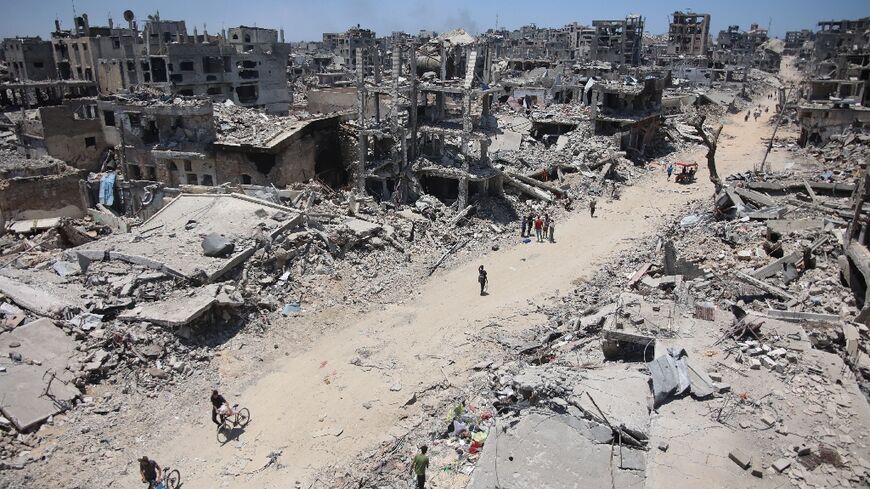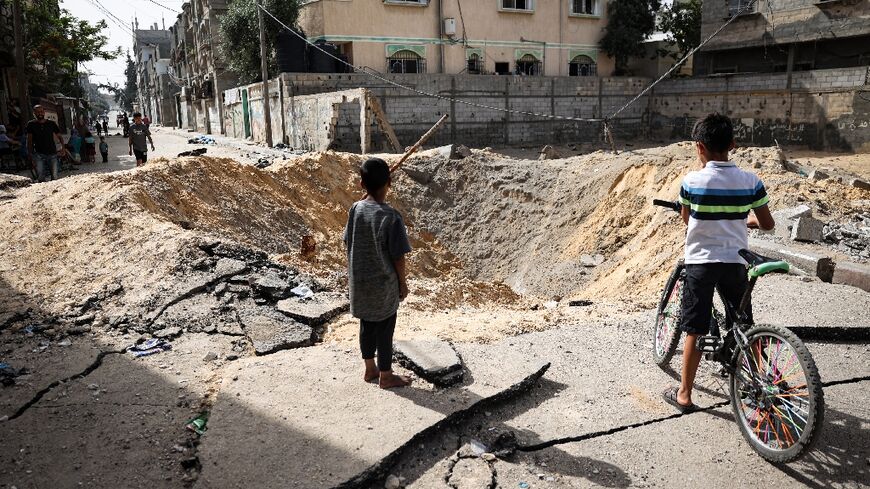Hamas health ministry says Israeli fire kills 20 Gazans waiting for aid

Gaza's Hamas-run health ministry said early Friday that Israeli fire killed 20 people and wounded 155 waiting to receive desperately needed aid in the besieged territory, but Israel said the reports were "erroneous".
Efforts mounted on Thursday to get more aid into the devastated Palestinian territory, where fighting still rages after mediators failed to reach a truce for the Muslim holy month of Ramadan.
The health ministry said in a statement that citizens had gathered at a roundabout in Gaza City in the north when they were fired upon by Israeli forces, revising upward an initial toll of 11 killed and 100 wounded.
Mohammed Ghurab, director of emergency services at a hospital in northern Gaza, told AFP there were "direct shots by the occupation forces" on people who had gathered at the roundabout to wait for a food truck.
An AFP journalist on the scene saw several bodies and people who had been shot.
The Israeli military denied it had opened fire on the crowd of Gazans waiting for aid.
"Press reports that Israeli forces attacked dozens of Gazans at an aid distribution point are erroneous," it said in a brief statement, adding that it was "analyzing the incident seriously".
- 'No alternative' -
UN agencies have warned of famine in Gaza, which Israel besieged after the unprecedented attack by Hamas militants on October 7.
The humanitarian emergency has forced some countries to use airdrops and sea routes for aid supplies because of limited land access to Gaza via Jordan, Israel and Egypt.
The Spanish aid vessel Open Arms, towing about 200 tonnes of food, was nearing Israel's coast after departing Cyprus on Tuesday, the Marinetraffic website showed on Thursday.
Cypriot Foreign Minister Constantinos Kombos said a second, bigger vessel was being readied for the maritime aid corridor, which will be complemented by a temporary pier to be built off Gaza by US troops.
However, the air and sea missions are "no alternative" to land deliveries, 25 organisations including Amnesty International and Oxfam said in a statement.
Dire shortages have left many scrambling for scraps of aid, among them Mokhles al-Masry, 27, who was displaced from Beit Hanoun to Beit Lahia in northern Gaza.
"There is no food, nothing to feed our children. We can't even find a bottle of baby milk. We've been wandering around since early morning, hoping that a plane would drop parachutes," he said.
Amnesty's secretary general, Agnes Callamard, said the decision to build the pier, could enable the provision of more than two million meals a day, suggested that the international community seemed to accept that the war will drag on.
- Netanyahu doubles down -
Israeli Prime Minister Benjamin Netanyahu doubled down on Thursday on pledges to invade Rafah in the south, where most of Gaza's population has sought refuge and Israel is threatening a ground assault.
"There is international pressure to prevent us from entering Rafah and completing the job," Netanyahu said.
"I will continue to repel the pressures and we will enter Rafah... and bring complete victory to the people of Israel," he said during a visit to a field intelligence base.
Around 1.5 million Palestinians have sought refuge along Gaza's southern border with Egypt in and around Rafah.
Israeli military spokesman Daniel Hagari said late Wednesday a "significant" number of them would need to be moved "to a humanitarian island that we will create with the international community".
The Israeli military said on Thursday it was "raiding Hamas's hideouts and military strongholds" in southern Gaza's main city of Khan Yunis.
In central Israel, police said a Gaza-raised Palestinian had stabbed a soldier in a shopping centre. The soldier shot his attacker dead before dying from his injuries, they said.
- 'Qatari pressure on Hamas' -
The war began with the October 7 Hamas attack on Israel that resulted in about 1,160 deaths, mostly civilians, according to an AFP tally of official figures.
Israel has carried out a relentless campaign of bombardment and ground operations in Gaza in retaliation, killing at least 31,341 people, most of them civilians, according to Gaza's health ministry.
Hamas militants also seized about 250 Israeli and foreign hostages, dozens of whom were released during a week-long truce in November. Israel believes about 130 of the captives remain in Gaza and that 32 are dead.
Activists and families of Israeli hostages kept up pressure for their negotiated release, again blocking a Tel Aviv highway in protest on Thursday.
And, in a sign of mounting US exasperation with Netanyahu, US Senate leader Chuck Schumer called for a snap election in Israel, describing the veteran hawk as one of several "major obstacles" to a two-state solution and peace.
Washington and other powers have called for a reformed Palestinian Authority to take charge of all Palestinian territories after the war.
The White House welcomed Palestinian president Mahmud Abbas's appointment of Mohammed Mustafa, a long-trusted adviser on economic affairs, as prime minister three weeks after his predecessor resigned.
US, Egyptian and Qatari mediators failed to broker a new truce in time for Ramadan but Netanyahu said Thursday there was now "Qatari pressure on Hamas".
"As of this moment, there has been no real response from Hamas. They are still clinging to unacceptable demands," he told representatives of hostages' families.
"As a result of our pressure... and also with your help, we are seeing -- for the first time -- Qatari pressure on Hamas."
The war has resulted in severe shortages of medical supplies across Gaza, with only a fraction of hospitals partially functioning.
World Health Organization chief Tedros Adhanom Ghebreyesus said aid had been delivered to Al-Aqsa hospital in central Gaza, which he said was "struggling with water, sanitation, hygiene and waste management".
Two of the hospital's warehouses were being used to shelter 7,000 displaced people, Tedros said.











